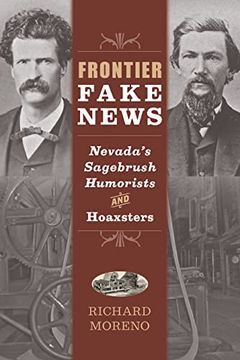Reseña del libro "Frontier Fake News: Nevada's Sagebrush Humorists and Hoaxsters (en Inglés)"
When readers see the names Mark Twain and Dan De Quille, fake news may not be the first thing that comes to mind. But these legendary journalists were some of the original, and most prolific, fake news writers in the early years of Nevada's history. Frontier Fake News puts a spotlight on the hoaxes, feuds, pranks, outright lies, witty writing, and other literary devices utilized by a number of the Silver State's frontier newsmen from the mid-nineteenth through the early twentieth centuries. Often known collectively as the Sagebrush School, these journalists were opinionated, talented, and individualistic. While Mark Twain (Samuel Clemens), who got his start at Virginia City's Territorial Enterprise, and Dan De Quille (William Wright), who some felt was a better writer than Twain, are the most well-known members of the Sagebrush School, author Richard Moreno includes others such as Fred Hart, who concocted a fake social club and reported on its gatherings for Austin's Reese River Reveille, and William Forbes, who enjoyed sprinkling clever puns with political undertones in his newspaper articles. Moreno traces the beginnings of genuine fake news from founding father Benjamin Franklin's "Supplement to the Boston Independent Chronicle, Number 705, March 1782," a fake newspaper aimed at swaying British public opinion, to the fake news articles of New York and Baltimore papers in the early 1800s. But these examples are only a prelude to the amazing accounts of petrified men, freeze-inducing solar armor, magically magnetic rocks, blood-curdling massacres, and other nonsense stories that appeared in Nevada's frontier newspapers and beyond.

